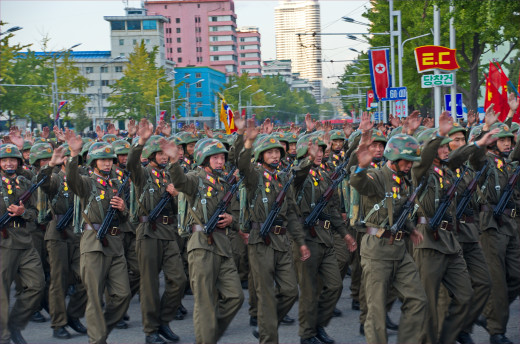Asymmetrical Warfare in an International Context

Asymmetrical warfare put simply, is any kind of conflict where there is a severe unbalance between the strength of the groups involved. This could be between states or non-state groups, and between two or several entities. In terms of international relations, asymmetrical warfare can be a problem, or it can be a solution. Either instance leads to great deal of international attention and concern. Issues of morality and human rights are prevalent, stability concerns are common, and where international support should be placed is debated. The commonality of asymmetrical warfare, especially in the last couple centuries, has made it increasingly more important in international relations. This distinction is also what makes it so interesting, that in an era of no empires and growing nations, the main source of conflict is in the form of small organizations attacking larger powers, and small nations defending what little they have from large, powerful states. Irrational state and non-state groups are on the rise and engage in conflict that, from a military standpoint, seems futile, but the ideologies are so strong that it seems worthwhile. International support is also strong, to the point where never does an asymmetrical war stay the same for very long, before another state steps in and either balances it out, or unbalances it from the others side.
State and Non-State Actors
One of the most common conditions that are applied to the nature of asymmetrical warfare is the two types of participants, states and non-state groups. Typically, either a state versus state scenario or a state versus non-state scenario occurs. By far the most easily resolved scenario is state versus state. Certain formalities are in place when two nations are in conflict, rules such as the Geneva conventions and rules of engagement. The military of each state will also be organized and supported by a legitimate government. This means that the conflict will carry on until one side can no longer fight, and the conflict is ended. In an asymmetrical war, the less powerful state will usually falter first, and surrender. There is the argument that states will have larger reserves and better access to resources, and thus, wars can be carried out for a considerable duration, even if one state is immensely superior to the other. However, this also assumes then that these states have economies and populations that must be supported, and only the most irrational governments would drive their state into the ground in order to continue a full scale war.
The other most commonly seen scenario is a state versus a non-state group. These are somewhat more difficult, as many of the formalities that are in a state versus state scenario, are not typically present. Non-state groups are not as centralized and tend to be spread over several countries. This isn't to say that non-state groups are unorganized, quite the contrary. The fact that they are organized and have a vast area of activity make them a legitimate threat, and also what makes them a more difficult opponent. The non-state group could be far inferior to its opponent, but its allusiveness compensates for the lack of resources and allows it to wage a much longer war. Some argue that even though the conflicts may draw on for a considerable amount of time, ultimately the non-state group does not stand a chance against the more powerful state. But this is refutable when the fact that many non-state groups could actually carry out a war indefinitely, assuming members stay devoted to the group. They can rely on guerrilla style warfare that is easier to support and wears down the states forces. Eventually, states will give up once death tolls and costs reach a certain point that victory is no longer worth it. For example, the United States involvement in Vietnam was ended when dealing with the constant conflict with guerrilla forces was no longer worth the American lives, especially when it was realized that the Viet-Cong was virtually no weaker than it had been at the beginning of the conflict.
Group Rationality
Rationality is an important concept to consider when discussing asymmetrical warfare. It is very common for less rational groups to instigate a conflict where they are at a clear disadvantage. This is typically due to ideological differences or possibly as a way to assert themselves as a power in the global community. However, it is also common that rational states will instigate a conflict, considering the know that they will have the upper hand.
Irrational states acting in this manner is the most problematic situation. Their irrationality lessens any concerns they have for their own people and their well being, and instead will focus entirely on the conflict at hand. It also causes them to be more reluctant with alliances and accepting aid, preferring instead to be entirely on their own. In any case when they do accept some sort of assistance, it is typically from another irrational group, who is only willing to help in order to accomplish their own goals. This alliance of irrationality would be a place of great concern for the international community, as the unpredictability of this alliance would be so great that it would be difficult for the rational states to prepare for any hostile actions. North Korea and Iran both are modern day examples of irrational states who have joined in an informal alliance against the west, both for ideological differences and as a method to gain credibility in the scheme of international relations. It may be argued that because of the rarity of a state being truly irrational, North Korea and Iran being countries that actually do express a bit of restraint and rationality, the threat is negligible, and that any coalition of powerful rational states would be sufficient to counteract the threat. But it is for this reason that the threat is even greater. The difficulty of bringing together a conglomeration of rational states is incredible. States are to concerned with their own well being, and if no immediate threat is detected, participation is unlikely. Also, while the odds of a truly irrational state existing are slight, even countries nearly so, like North Korea, pose a big enough threat that action would be warranted. This concern is even more exacerbated when nuclear capabilities may be involved.
Rational states, while usually considered to be those states that step in to balance or end an asymmetrical conflict, are also just as likely to cause unbalanced conflict as well. Because rational states act in a way that is most beneficial to them in all respects, the reasoning for causing a conflict is narrow. Asymmetrical wars are most appealing to these states as it requires the least military commitment, while minimizing their losses. Typically, the only solid reasons a rational state would be the cause of the war would be a perceived threat or resources. A perceived threat may been seen as a less than concrete reason for engaging in conflict by some, because if the state is the more powerful of the two, then there would be little actual threat. If the state was the least powerful, then engaging in conflict would appear to be suicide, unless another state was supporting. But even a small state can pose a serious threat to any nation, especially one with nuclear weapons. In terms of resources, this is not a viable reason in today's world. It is no longer acceptable to attack a state just for the acquisition of resources, now that world trade is as accessible as it has become.The fortunate aspect to a rational state beginning the conflict is that they are more likely to withdraw when the odds turn against them or when the situation becomes hopeless, either because of global support being against them, or some other issue, to maintain self-preservation, which irrational states may very well look past.

Alliances and International Support
Alliances add another dynamic to asymmetrical warfare. They can balance out the war, they can reverse the asymmetrical aspect, or they can increase the overall asymmetry already present. Alliances usually serve a positive purpose to asymmetrical warfare, as it can serve as the deciding factor. Which either side has a stronger alliance will usually be successful in the end, regardless of initial unbalanced conditions, because of the increased benefits of additional economic factors to help supply the war effort. Alliance support is also important as it increase global support because of countries tendencies to side with the most favored side. Alliances, though, draw more people and resources into these wars that may or may not directly effect the rest of the alliance, and causes unneeded waste and death, and potentially lengthen the conflict. But the added support actually allows for faster results, and overall faster resolutions. In the long run this will be much more beneficial.
Another aspect that can really be a deciding factor in an asymmetrical war is the strength and direction of global support. Even the less advantageous side in an asymmetrical can be immensely benefited by a strong support from the international community, to a point that the war can actually appear balanced. Similarly to alliances, this support can take the form of supplies and forces, or it can simply be political support, which then make the other side considerably less liked in the global scheme of things. Support can come from states, which provides organization and reliable commitments of supplies. Non-state groups have the advantage of being allusive and not tied down by typical constraints that states have. When the combatant is a non-state group, support from a state provides credibility to them as a force. Global support, especially when given to the less advantageous side of the asymmetrical conflict, could be seen as something that would extend the war unnecessarily. But a huge amount of support actually serves as a deterrent to continue the conflict, because even if the the other side is victorious, they will be shunned as a nation in the global community and in international relations. Overall the support will always be beneficial, regardless of what side it is on as it ultimately decides where the correct side is in terms of international relations.
In many instances of asymmetrical warfare, a war by proxy situation develops. This is due usually to alliances or additional support from a very powerful state to a small state or non-state group. The larger states usually support the side who supports their goals and interests in preventing another from infringing on those interests. In many instances this is done covertly, as was seen in the Russian invasion of Afghanistan, where the United States supported Afghanistan to prevent the spread of communism. Often, and in this case, the support is enough to turn the tide of the battle, especially when only one side has any support. This essentially balances out the war or reverses the asymmetry, while on the surface still appearing as favoring the more advantageous entity in the war. Unfortunately, when both sides are supported by third parties, then essentially a war is fought between these parties, and the initial participants are just the front for them. This is one of the worst instances of asymmetrical warfare as the conflict lasts much longer, while not making any gains for the actual participants, as was seen during the conflict in Vietnam.
In today's world of large superpowers, smaller developing countries, and violent independent groups, asymmetrical warfare is going to be the norm in military conflicts. Even as the smaller nations reach levels of power that are comparable to the top countries in the world, asymmetrical warfare will continue to be prevalent. Because of the impossibility of every nation to have the same power in terms of military strength, it will never happen that every conflict will be completely balanced. Irrational states will continue to wage war with states many times more powerful than themselves and terrorist groups will be an ever present threat, whether domestic or foreign. I do not foresee a time when asymmetrical war will no longer be an occurrence, and in fact, it will actually increase as smaller nations begin to develop their military, and as more non-state groups are formed. However, it will actually be beneficial for more wars to be asymmetrical, as it ensures shorter, less destructive wars, because of the weaker side being overwhelmed, as opposed to balanced wars that lead to ongoing stalemates, that bring about large amounts of death and destruction, with each side being able to counter the other. Asymmetrical warfare, is overall, the ideal method for carrying out armed conflict in today's world, both in terms of international relations, and the well being of the global community.
This content is accurate and true to the best of the author’s knowledge and is not meant to substitute for formal and individualized advice from a qualified professional.





